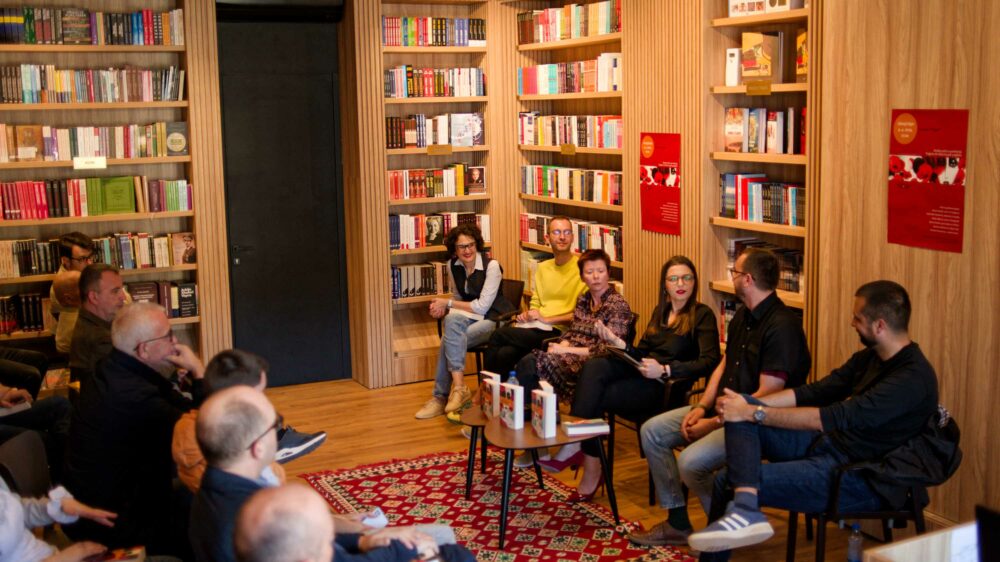A literary evening was held in Ulcinj on 4 April 2024 where we talked about the 6th multilingual Biber Contest for short stories about reconciliation, which is currently open, as well as the previous collections that resulted from the Contest.
The event was organised at Libraria Ulqini and saw the participation of authors whose stories were published in previous Biber Collections: Aida Šečić Nezirević (Travnik), Srđan Miljević (Belgrade), Nikola Nikolić (Podgorica), as well as translator Qerim Ondozi (Pristina).
Katarina Milićević (Biber Team, Centre for Nonviolent Action Sarajevo-Belgrade) spoke about how the idea of the contest originated, developed and changed through the years since 2016 when the first Biber Contest was organised.
Katarina greeted those gathered in Ulcinj and said: “First, I want to thank the city of Ulcinj and its citizens. We’ve organised almost a third of our peace education programmes here in Ulcinj and we have always been very warmly welcomed. It was at one such peace training that we started thinking about organising a peace contest and that is what led us to Biber.”
The 6th Biber Contest is open until 26 May 2024. Authors writing in Albanian, Macedonian, Serbian, Montenegrin, Croatian or Bosnian are welcome to send in their short stories. Information about eligibility and how to apply can be found by following this link.
The stories selected by the jury for the prizes or to be published in the collection are then translated into the other languages of the Contest. The jury selecting the stories in the 6th Contest comprises: Tanja Stupar Trifunović, Almin Kaplan and Jasna Dimitrijević.
Qerim Ondozi has been working as a translator for the Biber Contest from the very beginning and had this to say about what makes this Contest specific in regional terms:
“Our memories are not just something our brain generates as images we see because we decide to see them. Our other senses register things as well, and involuntarily, so that memories can take the shape of feelings or even scents, which lends them a stronger impression,” Qerim said.
Arlinda Osmanoviq acted as moderator and the event was organised collaboratively by Libraria Ulqini and the Centre for Nonviolent Action Sarajevo/Belgrade.
Nikola Nikolić said he was honoured that his story „Antifada” was included in the Biber Collection and added, “I wanted to portray the life of a Palestinian woman who lost her son, so my story is about the conflict between Israelis and Palestinians, but I wrote it back in 2020.” Nikola also commented on the social impact of literature and writers: “Writers can be a corrective factor, they can connect people and cross borders. They should be a line of connection and not separation.”
Aida Šečić Nezirević who wrote the story „Pogača” [Bread] said her story was 90% true. Commenting on the current situation, she said, “I’m a proofreader and at the price of getting fired, I have to say I am forced to split our language into four, into Bosnian, Croatian, Serbian and Montenegrin, but these aren’t four different languages, they are one language. The division makes no sense. We writers are doing our best not to distance ourselves from each other.”
Srđan Miljević wrote the story “Rat je ružna reč” [War is a Bad Word] and had this to say about it: “My story of war is told from the perspective of a child, because children don’t understand hatred”.
The short story collections we presented resulted from the Biber Contests for short stories about reconciliation in the context of the legacy of the wars and violence in the countries of former Yugoslavia, as well as stories contributing to better understanding among people, reducing hatred and dismantling prejudice, anti-war stories, stories about dealing with the past, deconstructing images of the enemy, empathy, brave stories that dare walk in the “enemy’s” shoes, stories that push boundaries and open up the way to build a more stable, safer and freer future for all.
All the Biber contests and short story collections are multilingual and open to authors writing in Albanian, Bosnian, Montenegrin, Croatian, Serbian and Macedonian.
Electronic editions of all Biber collections are available at https://biber.nenasilje.org/biber-stories/?lang=en and are free to download.
The photo gallery can be viewed HERE.

